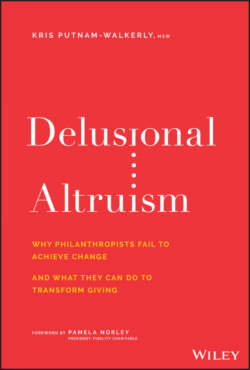Читать книгу Delusional Altruism - Kris Putnam-Walkerly - Страница 15
Believing You Are Too Small to Make a Difference
ОглавлениеNot every philanthropist is a billionaire. You might be giving away thousands of dollars each year, not hundreds of millions. But a small funder should not limit its aspirations. Even donors with limited means can operate with an abundance mind-set. The world is rife with examples of small funders that created big impact. In fact, Exponent Philanthropy, a U.S.-based network of foundations with few or no staff, philanthropic families, and individual donors, regularly showcases members who achieve “outsized impact” compared to their size.
Too often, however, funders of all sizes believe they are too small to make a difference.
One philanthropy leader had this kind of poverty mind-set when it came to achieving her strategic goals. Her organization organized high-net-worth members to donate to progressive causes. They set specific goals of tripling the number of donor members and dramatically influencing how those donors allocated their funding.
However, she didn't know her baseline. She had no idea how much money her members were already donating to progressive causes. Nor did she know how much influence her organization currently had on her members' giving priorities.
She had a vision for her organization's desired future state, but no idea about its current state. Therefore, it was impossible to create a plan to move forward. When I suggested she conduct research to understand their current baseline, she balked. “No, we're just a small nonprofit. We really can't afford it,” she insisted. Instead, she asked her staff—who were already working overtime and lacked research expertise—to figure it out on their own.
In other words, she was unwilling to make an investment in something of strategic importance to the organization, because she felt her organization was “just a small nonprofit.”
Remember, her membership organization is comprised of high-net-worth donors who saw the value in this organization's work. They paid to be members! The wealth was sitting right there. But she wasn't willing to ask any of them to support this project. I'm sure one of her members would have been delighted to fund a research project that would help more philanthropists donate to progressive causes. But her scarcity mentality held her back and stifled her organization's philanthropic impact.
